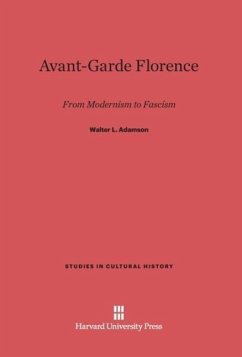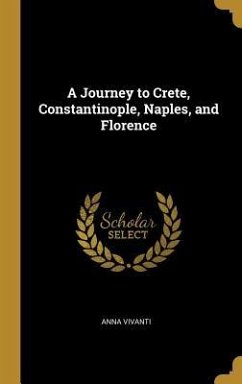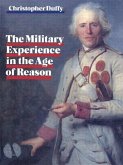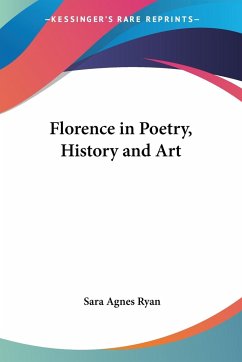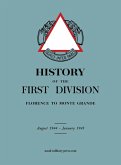They envisioned a brave new world, and what they got was fascism. As vibrant as its counterparts in Paris, Munich, and Milan, the avant-garde of Florence rose on a wave of artistic, political, and social idealism that swept the world with the arrival of the twentieth century. How the movement flourished in its first heady years, only to flounder in the bloody wake of World War I, is a fascinating story, told here for the first time. It is the history of a whole generation's extraordinary promise--and equally extraordinary failure.
The "decadentism" of D'Annunzio, the philosophical ideals of Croce and Gentile, the politics of Italian socialism: all these strains flowed together to buoy the emerging avant-garde in Florence. Walter Adamson shows us the young artists and writers caught up in the intellectual ferment of their time, among them the poet Giovanni Papini, the painter Ardengo Soffici, and the cultural critic Giuseppe Prezzolini. He depicts a generation rejecting provincialism, seeking spiritual freedom in Paris, and ultimately blending the modernist style found there with their own sense of toscanità or "being Tuscan."
In their journals--Leonardo, La Voce, Lacerba, and l'Italia futurista--and in their cafe life at the Giubbe Rosse, we see the avant-garde of Florence as citizens of an intellectual world peopled by the likes of Picasso, Bergson, Sorel, Unamuno, Pareto, Weininger, and William James. We witness their mounting commitment to the ideals of regenerative violence and watch their existence become increasingly frenzied as war approaches. Finally, Adamson shows us the ultimate betrayal of the movement's aspirations as its cultural politics help catapult Italy into war and prepare the way for Mussolini's rise to power.
The "decadentism" of D'Annunzio, the philosophical ideals of Croce and Gentile, the politics of Italian socialism: all these strains flowed together to buoy the emerging avant-garde in Florence. Walter Adamson shows us the young artists and writers caught up in the intellectual ferment of their time, among them the poet Giovanni Papini, the painter Ardengo Soffici, and the cultural critic Giuseppe Prezzolini. He depicts a generation rejecting provincialism, seeking spiritual freedom in Paris, and ultimately blending the modernist style found there with their own sense of toscanità or "being Tuscan."
In their journals--Leonardo, La Voce, Lacerba, and l'Italia futurista--and in their cafe life at the Giubbe Rosse, we see the avant-garde of Florence as citizens of an intellectual world peopled by the likes of Picasso, Bergson, Sorel, Unamuno, Pareto, Weininger, and William James. We witness their mounting commitment to the ideals of regenerative violence and watch their existence become increasingly frenzied as war approaches. Finally, Adamson shows us the ultimate betrayal of the movement's aspirations as its cultural politics help catapult Italy into war and prepare the way for Mussolini's rise to power.
Adamson's is the most detailed account now available in English of two influential early twentieth-century Florentine reviews, Leonardo and La Voce, and the careers of the men who founded them and dominated their pages, principally Giovanni Papini, Giuseppe Prezzolini, and Ardengo Soffici. Through the story of these men and their enthusiasms, spiritual crises, and conversions, we get a fascinating view of early twentieth--century Western culture as it was seen arid experienced in central Italy. Adamson tells this tale, quite fascinating in itself, in such a way that it will be comprehensible to readers who know little (or nothing) about modern Italian history arid in so doing makes an important contribution to the debate over modernism and its meaning for historians.
Adamson shows the signal importance of the Florentine modernists for the ideological development of Italian fascism. In so doing, he undermines the conventional assumption that the Milanese Futurists were the main intellectual culprit s. Based oil prodigious research in primary sources and judicious in its assessment of figures whose dubious politics might easily elicit more intemperate judgments, this work is also a delight to read. Skillfully combining individual biographical accounts of the major players with broad overviews of Florentine and Italian historv, it provides a richly text tired, dramatically nuanced narrative of a movement that sought cultural regeneration and produced political disaster. It is a model of collective intellectual history, situated in a particular urban setting. As such, it will be of interest to scholars outside of Italian history narrowly defined.
Adamson shows the signal importance of the Florentine modernists for the ideological development of Italian fascism. In so doing, he undermines the conventional assumption that the Milanese Futurists were the main intellectual culprit s. Based oil prodigious research in primary sources and judicious in its assessment of figures whose dubious politics might easily elicit more intemperate judgments, this work is also a delight to read. Skillfully combining individual biographical accounts of the major players with broad overviews of Florentine and Italian historv, it provides a richly text tired, dramatically nuanced narrative of a movement that sought cultural regeneration and produced political disaster. It is a model of collective intellectual history, situated in a particular urban setting. As such, it will be of interest to scholars outside of Italian history narrowly defined.

